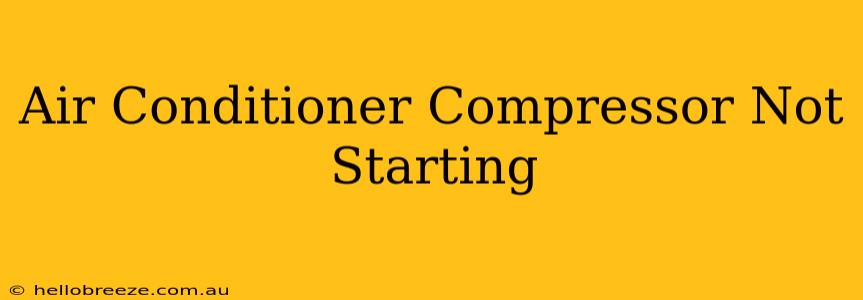Is your air conditioner refusing to blow cold air? A common culprit is a compressor that won't start. This comprehensive guide will walk you through troubleshooting this frustrating problem, helping you identify the cause and potentially saving you a costly repair bill. We'll cover everything from simple checks to more involved diagnostics.
Common Reasons Why Your AC Compressor Isn't Starting
Several factors can prevent your AC compressor from engaging. Let's explore the most frequent causes:
1. Power Issues:
- Tripped Breaker or Blown Fuse: This is the easiest fix. Check your home's electrical panel for a tripped breaker related to your AC unit. Reset it and see if the compressor starts. If the breaker trips again immediately, you likely have a more serious electrical problem. Similarly, inspect your fuse box for a blown fuse.
- Loose Wiring: Check all electrical connections to the compressor and the condenser unit. Loose or corroded wiring can interrupt the power supply. Tighten any loose connections and clean off any corrosion. Caution: Always disconnect the power supply before working on any electrical components.
2. Refrigerant Problems:
- Low Refrigerant: A lack of refrigerant is a major reason for compressor failure. The compressor works harder to compensate, leading to overheating and eventually shutting down. You'll likely need a professional HVAC technician to recharge the system, as refrigerant handling requires specialized equipment and knowledge. Never attempt to add refrigerant yourself.
- Refrigerant Leaks: Leaks in the refrigerant lines can cause a refrigerant shortage. Finding and repairing these leaks requires specialized tools and expertise.
3. Compressor Issues:
- Compressor Failure: The compressor itself might be faulty. This is often due to age, wear and tear, or overheating. Replacement is usually necessary, requiring professional assistance.
- Compressor Overload: The compressor might be overloaded due to a restricted airflow, causing it to shut down to prevent damage. Check for obstructions around the condenser unit, ensuring proper ventilation. Cleaning the condenser coils is crucial for optimal performance.
4. Capacitor Problems:
- Bad Start Capacitor or Run Capacitor: The capacitor provides the initial surge of power needed to start the compressor. A faulty capacitor can prevent the compressor from starting. Replacing the capacitor is a relatively straightforward repair for those with basic electrical knowledge, but always exercise caution and consult a qualified technician if unsure. Visual inspection may reveal bulges or leaks on the capacitor casing.
5. Control Issues:
- Faulty Control Board: The control board regulates the operation of the AC unit. A malfunctioning control board can prevent the compressor from engaging. Diagnosing and repairing a control board requires advanced technical expertise.
- Pressure Switches: These switches monitor the pressure of the refrigerant in the system. If the pressure is too low or too high, these switches will prevent the compressor from running to protect it from damage.
Diagnosing the Problem: A Step-by-Step Approach
- Check the Power Supply: Begin by checking the breaker box and fuse box, ensuring power is reaching the unit.
- Inspect Wiring Connections: Carefully examine all wiring for looseness or corrosion.
- Assess Airflow: Ensure there's no blockage around the condenser unit, obstructing airflow.
- Listen for Unusual Noises: Unusual sounds emanating from the compressor or other components could indicate a problem.
- Check the Capacitors: Visually inspect the capacitors for any signs of damage.
When to Call a Professional
While some simple troubleshooting steps can be performed independently, certain issues require the expertise of a qualified HVAC technician. These include:
- Refrigerant leaks and recharging
- Compressor replacement
- Control board repair or replacement
- Complex electrical issues
Ignoring a malfunctioning air conditioner can lead to further damage and expensive repairs down the line. Addressing the problem promptly is key to maintaining your system's efficiency and lifespan. Remember to always prioritize safety and consult a professional when necessary.

